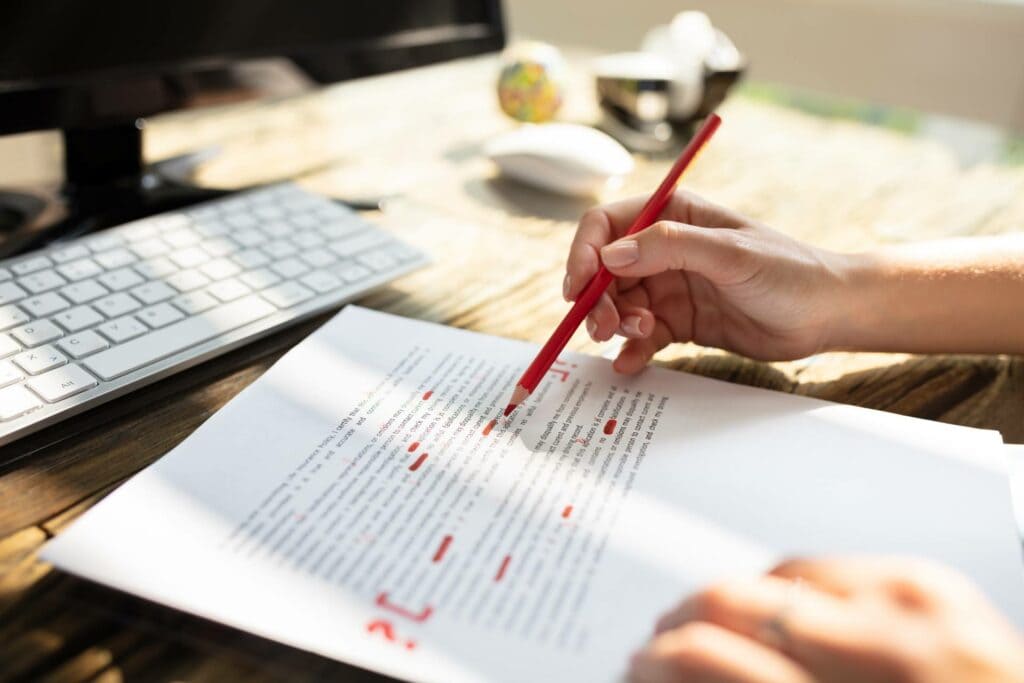You had an idea for a book, and you’ve successfully invested hours into it to get a draft. You now believe that after a few rounds of rewriting and self-editing, you can publish your book and become a bestseller, right?
Well, as great as that sounds, it isn’t how award-winning books are written.
For one—and we can’t emphasize enough this—a writer is NOT an editor. You could be exceptional at what you do, but there are some things better left to those who excel in them.
Perhaps one of indie authors’ biggest mistakes is assuming the role of writer, editor, and critic for their manuscript. This is why self-published books—although a growing industry—struggle to make it onto bestseller lists.
Although there are different types of editing and editors—all of which we will briefly explain—the most crucial to any manuscript is a developmental editor. They are the ones who ensure that your narrative-building is solid and there are no gaping holes in your story.
If you want to learn more about this type of editing, you’re in the right place.
In this blog, we will:
- Explain the different types of editing services
- Tell you what developmental editing constitutes
- Explore what a developmental editor does
- Offer tips for finding the right editor for your book

Book Editing Services—what are they?
Before we get into the detail about developmental editing—and we will shortly—it is important to understand the importance of book editing services and get an idea of what they are.
Looking at the distinction between traditional publishing and self-publishing is the ideal place to start in order to comprehend the whole array of editing services. Simply put, conventional publishing aims to generate flawless text that can be mass-produced in both print and digital versions.
This implies that a publishing business will frequently concentrate on providing the best editorial comments regardless of expense. This is accomplished with the use of internal assistance from a variety of editors.
The process for self-publishing is different.
When self-publishing, a writer will have a limited budget and will concentrate on producing the finest book for the least amount of money.
This implies that authors who self-publish frequently forgo editing services like proofreading in favor of other forms of expert editorial assistance like manuscript evaluation or beta-reading.
The editorial process for self-publishing
Self-publishing procedures are usually very different from those of traditional publishing. This is due to a variety of factors, the most significant of which is that authors who self-publish will have a lesser budget and less access to an editing staff. In actuality, a self-publishing author might only collaborate with one book editor.
A self-publishing author would, therefore, frequently skip the different editing stages because they might not always deem them necessary.
Additionally, some authors, particularly those who self-publish a book, may seek a professional manuscript evaluation before starting an edit. This is highly recommended, especially for those on a strict budget. Paying for an appraisal helps authors subsequently save money on edits they don’t even need.
What Do Book Editors Do?
Book editor is the general term used for people who offer any and all kinds of editing services In the book publishing industry.
A book editor will read your manuscript and offer the criticism required to get it ready for publishing. A developmental editor concentrates on the storyline, a copy editor on the grammar and punctuation, and a proofreader on the page layout. Here’s even more distinction between the different types:

Copy editing vs. Developmental editing
The practice of copy editing involves eliminating errors and typos from a text.
The copy editor will make word and punctuation adjustments at the sentence level. Additionally, they will try to maintain uniformity across the whole book. They’ll make sure the appropriate strategy is used in each sentence and paragraph.
Contrary to this, a developmental edit is a type of editing where editors make changes to the storyline, flow, focus, and other aspects of the work. The most thorough adjustments made to content during the development phase are called developmental edits, as the name implies.
Line editing versus copy editing
A line edit looks at the linguistic construction of sentences and paragraphs, creative substance, and writing approach. It isn’t, essentially, for finding errors in your manuscript. Instead, a line edit focuses on how you use language to tell your tale to the reader.
It addresses the following questions: Is reading what you write easy and enjoyable? Does it successfully express mood, emotion, and tone? Are you utilizing specific phrases that express your message, or are you employing generalizations and clichés?
A copyedit, on the other hand, aims to correct errors that are particularly technical in nature and ensure that the writing that appears on the page adheres to accepted standards.
What is substantive editing?
This is the same as developmental editing.
The goal of substantive editing, often referred to as structural editing, is to improve the structure, substance, and overall presentation of a book from the beginning to the finish. Authors can better shape their manuscripts by defining their objectives, identifying their readers, and working with substantive editors.
What is Developmental Editing?
Developmental editing is a structural edit of your book that helps you get on top of any inconsistencies that could stand in the way of your success.
During the developmental edit of the book, editors collaborate with authors to address “big picture” problems with their manuscripts, such as those involving form, structure, storyline, and characters. This form of editing typically won’t fix sentence-level problems like incorrect punctuation and grammar because it concentrates on larger plot themes.
After reading your manuscript, your developmental editor will provide you with detailed input on the structure of your tale. It’s preferable to finish this before delving too far into grammar, word choice, and other finer points.
Your target audience will be kept in mind while an editor evaluates your work with respect to industry norms and expectations throughout good developmental editing. Your manuscript won’t be ready for a copy edit and proofreading until it has been rewritten, reshaped, and improved.
We advise obtaining a developmental edit after the first draft if it’s your first book. You’ll make the most of your editing process by receiving comments early on from your editor regarding the genre, plot structure, and overall shape of your book.
If this isn’t your first time authoring a book and you feel like you have more of a grip on plot structures, you can wait till the second draft to hire a developmental editor.
After you’ve done everything you can with your novel and between the first and second drafts, you may already be aware of some of the most significant adjustments you want to make. Your editor will then work with you to advance your book.
We still advise obtaining a developmental edit, even if you’re past your third draft. You won’t believe how much information and perspective your editor can provide to you; this is the most effective type of editing you can receive.
What questions does developmental editors answer?
While there is a lot to developmental editing, a good editor will ask the following questions while working on your manuscript to ensure it is not lacking:
- Does the book’s organization make sense?
- Is there a larger narrative arc that draws the reader in and carries them through the story?
- Does it have a logical point of view? Is it consistent with the plot?
- Have narrative devices been used correctly?
- Does each scenario provide enough description?
- Does the order of the chapters make sense?
- Does the author have a grasp of the scene structure?
- Is the description of each new character complete?
- Are the characters well-developed enough?
- Are the characters credible and true to form?
- Are there any glaring storyline holes?
What is a developmental editor?
Now that you know what substantive editing is, you can now tackle the next question: what does a developmental editor do?
Developmental editors are focused on your book’s organization and content. Your developmental editor will assist you in determining the “correct” route, which is typically the most marketable if your work lacks direction.
Additionally, some independent developmental editors search for issues with sentence structure, grammar, and punctuation at the line level. The more competent editors will evaluate a book’s marketability. They could also assist you in accurately identifying the book’s genre.
Generally, a developmental editor will focus on the following:
The genre of your book
What kind of narrative are you producing? What aspects of that kind of fiction may readers anticipate? Are those components used in intriguing and original ways?
Your book’s organization
Does it have a start, middle, and end? Does the narrative have an inciting event, a climax, and a resolution? Does the narrative have all of these elements? Have you made your thesis in a nonfiction book crystal clear and arranged the information in a way that makes sense from beginning to end?
The characters in your book
Do you have too many or too few characters? What are they aiming for? Do they make compelling decisions to reach their objectives? Do their decisions advance the story and demonstrate excellent characterization?
The theme of your book
What is the genuine subject of this book? What motivated you to write it, and why is it significant to you? What do you want the audience to remember about it? How can you make that topic stronger and more pervasive throughout the narrative?
The anticipations of your readers
Will readers be satisfied with your book? Will it be distinguished from other books in its category on the shelf as one that adds something fresh and intriguing?
The loose threads in your story
There are frequent points in a story where you are unsure how to connect several threads. Sometimes you can visualize a character’s entire story arc, but you’re not sure how another one will turn out.
The right developmental editor for your book
No developmental editor is categorically “better” than the others; each expert has a particular combination of experiences, abilities, and working methods that make them more suitable for particular writers and projects. However, here are some things to think about while choosing your editor:
Rank editors according to the genres they specialize in
It’s possible that a developmental editor with ten #1 best-selling memoirs is not the right fit to work on your historical fiction novel.
Examine their professional background
Do you favor editors who have collaborated with well-known writers? Or do you require someone who has experience working with debut authors?
Identify the type of criticism to which you are most responsive.
Some authors require supportive and motivating editors. Some people like giving feedback that is blunter. Choose based on what helps you grow as a writer.
Verify that your methods of communication are compatible
Are in-person discussions important to you? Do you require updates every week, or are you ok with hearing from them only occasionally while they are editing?
Final Thoughts
Developmental editing is a crucial step in publication. When a book is declared “ready,” it happens, and it’s frequently the author’s first experience with receiving criticism or working with a developmental editor. This kind of editing will prompt some rewriting, and before the manuscript is ready for the next step, it could go through numerous changes.
You put a lot of effort into writing your book. Send it to a fantastic developmental editor for comments, and treat it with the respect, care, and commitment it deserves.
Your readers and your book will appreciate it!





